Boris Johnson borrowed more money in five months to tackle coronavirus than the Government did in entire YEAR after 2008 financial crash as national debt spikes above £2 TRILLION
- The bruising economic fallout of the pandemic was laid bare by the OBR
- From April to August this year net borrowing ballooned beyond £173billion
- Chancellor Rishi Sunak yesterday unveiled his Winter Economy Plan to save jobs
- Centrepiece of plan is Jobs Support Scheme to replace furlough end of October
Boris Johnson borrowed more in five months to tackle coronavirus than the Government did in the entire year after the 2008 financial crash.
The bruising economic fallout of the pandemic was laid bare by the Office for Budget Responsibility (OBR) as the UK’s national debt surpassed £2trillion.
In in a bleak 10-page analysis of the state of the public sector finances, the OBR underscored how deep the nation had plunged into the red.
From April to August this year net borrowing ballooned beyond £173billion as the Chancellor Rishi Sunak bankrolled furloughed employees’ wages and handed rescue loans for businesses.
The eye-watering figure is a £146.9billion increase on last year and, with more than half the fiscal year still to go, smashed the £157.7billion annual total set during the peak of the financial crisis in 2009-10 when Gordon Brown’s administration’s grappled with global recession.
The report read: ‘Less than halfway through the 2020-21 fiscal year, the budget deficit has already topped full-year borrowing in 2009-10 (at the peak of the financial crisis).’
It went on: ‘Today’s data highlight the growing fiscal cost of the coronavirus crisis, although it will still be many months before the full impact of the shock becomes clear.’
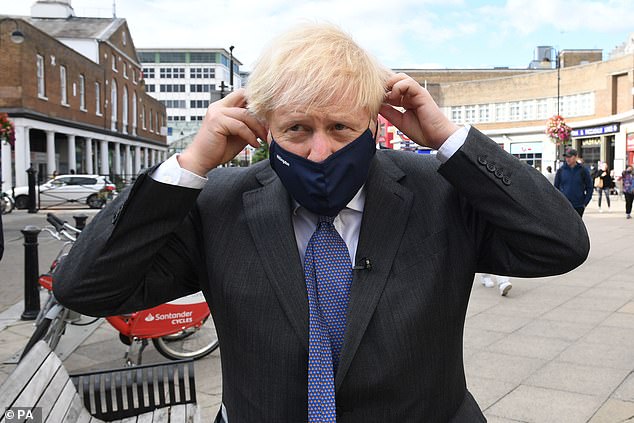
Boris Johnson (pictured visiting his Uxbridge constituency today) borrowed more in five months to tackle coronavirus than the Government did in the entire year after the 2008 financial crash
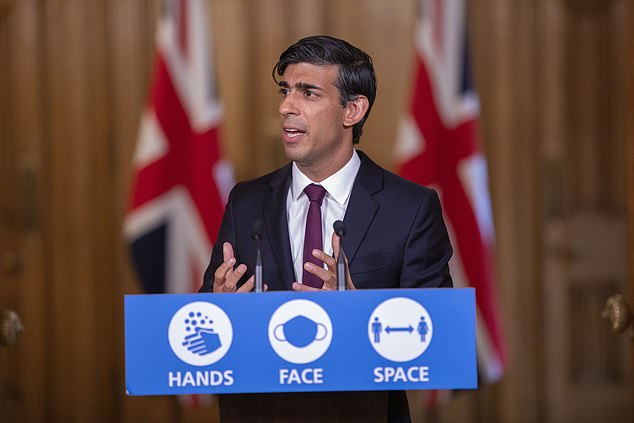

Chancellor Rishi Sunak is under pressure from Tory MPs to spell out how the UK will pay for the coronavirus crisis after he yesterday hinted at tax rises
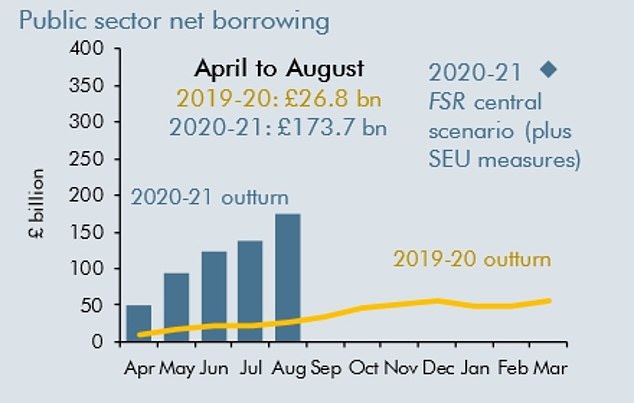

From April to August this year net borrowing ballooned beyond £173billion as the Chancellor Rishi Sunak bankrolled furloughed employees’ wages and handed rescue loans for businesses
Mr Sunak yesterday unveiled his Winter Economy Plan to safeguard jobs as the furlough scheme is wound down next month.
It included a wage subsidy Jobs Support Scheme to replace furlough as well as further VAT cuts for the hospitality and retail sectors and the extension of emergency loan schemes.
Economists estimated the giveaway could cost £5 billion, potentially taking the total cost of the Government’s Covid-19 support to approximately £200 billion.
The OBR briefing highlighted how central government spending is already a third higher than last year.
‘Central government spending so far in 2020-21 is 33 per cent higher than a year earlier, reflecting the cost of the coronavirus job retention and self-employment income support schemes, plus additional grants to local authorities and higher public services spending.’
Mr Sunak hinted that tax rises will eventually be required to get the public finances back on an even keel as he said he will have to make ‘difficult decisions’ in the future.
But Conservative backbenchers want ministers to urgently set out their plan for paying the money back as they warned the Government it cannot ‘keep kicking it into the long grass’.
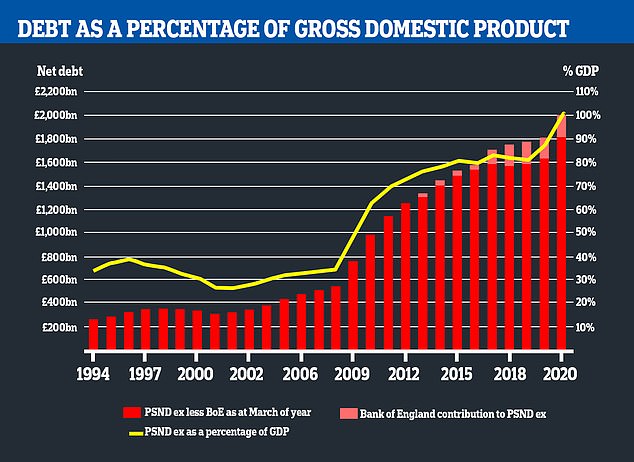

The Office for National Statistics today revealed that public sector debt has continued to climb above £2 trillion
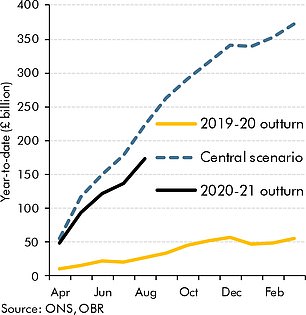

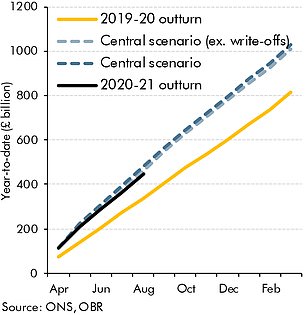

Public sector borrowing is £146.9billion more than last year (left), while central government spending has increased by a third (right)
The scale of the Government’s coronavirus spending was illustrated in stark terms this morning after the Office for National Statistics said the UK’s national debt had hit a record £2.024 trillion at the end of August.
That figure is almost £250 billion more than it was at the same time last year as borrowing hit 101.9 per cent of gross domestic product after £36 billion was borrowed by the public sector in August alone.
It came as Chief Secretary to the Treasury Stephen Barclay today insisted the Jobs Support Scheme will incentivise employers to keep on staff amid claims it would be cheaper for firms to bring back one furloughed employee than two working part-time.
He said that assessment ‘doesn’t reflect the fact that many employers value the flexibility of being able to tailor how much time employees are working as we go through the uncertainty of the winter months’.
Meanwhile, Lord Wolfson, the chief executive of Next, warned Britain’s economy risks ‘becoming hooked’ on Government handouts as he also said many roles are likely to be lost across the retail sector as consumers make a permanent shift to shopping online.
The latest figures spelling out the state of the national finances came as:
- Former prime minister Gordon Brown said he believes that Chancellor Rishi Sunak will have to rethink his jobs plan to deal with the pandemic amid concerns it does not go far enough to stop a wave of redundancies.
- Mr Brown called on the four home nations to ‘co-operate more intensively to get things done’ during the coronavirus crisis.
- Sir Mark Walport, a member of the Government’s Sage panel of experts, said university students may have to remain on campus over Christmas if there are Covid-19 outbreaks.
- Scotland’s Higher Education Minister Richard Lochhead said dealing with the outbreaks in universities is a ‘big challenge’.
- More than 40 Tory MPs are now calling on the Government to give Parliament a vote on any new lockdown measures.
- Labour’s shadow chancellor Anneliese Dodds warned unemployment is heading towards ‘1980s levels’ despite Mr Sunak’s wage subsidy package
National debt passed £2 trillion for the first time in history in July as the Government continues to throw billions of pounds at offsetting the economic chaos caused by the Covid-19 crisis.
That figure continues to rise as the pandemic continues with the ONS today revealing that the £36 billion borrowed in August this year was £30.5 billion more than was borrowed in August last year.
It was also the third highest borrowing in any month since records began in 1993.
Borrowing in the first five months of this financial year, April to August 2020, is estimated to have been £173.7 billion.
That is £146.9 billion more than in the same period last year and the highest borrowing in any April to August period since records began in 1993.
Meanwhile, the Government’s tax receipts have been hit hard with £37.3 billion collected in August this year, some £7.5 billion less than in August 2019.
Central government is estimated to have spent just shy of £80 billion on day-to-day services in August, more than £19 billion more than in August 2019.
The dire borrowing figures have prompted growing unease among Tory MPs as they call for the Government to set out its strategy for how to pay for the crisis.
One Tory MP told Politico: ‘I don’t think Sunak had any alternative to do what he did to avoid destitution.’
But they added: ‘How it all gets paid for will be the mystery of our time.’
Another Conservative backbencher said the Government needs to publish a pay back plan sooner rather than later.
‘It’s not good enough to keep kicking it into the long grass,’ they said.
Mr Sunak was asked at a Downing Street press conference yesterday how the UK will pay for the Government’s massive spending this year.
Hinting at potential future tax rises, he said: ‘Over time and as the economy recovers we absolutely need to have an eye on our public finances and to make sure that we are in a strong and sustainable position.’
He added: ‘I will obviously have to make similar difficult decisions in the future as we get on a path back to sustainability but right now the priority is supporting the economy, throwing everything we have got at protecting people’s jobs and that is what I will continue to do.’
Much of the Chancellor’s Winter Economy Plan was broadly welcomed by businesses but there are concerns that there will still be massive redundancies in the coming months.
Experts said the Jobs Support Scheme is significantly less generous than the furlough programme it is replacing and critics claimed it could actually incentivise employers to get rid of staff.
Mr Barclay this morning defended the scheme against suggestions that it may actually be cheaper to bring back one furloughed employee than two on half-time.
He said: ‘What that doesn’t take on board, a spreadsheet interpretation, doesn’t reflect the fact that many employers value the flexibility of being able to tailor how much time employees are working as we go through the uncertainty of the winter months and they want to retain the skills and expertise of their labour market.’
The Jobs Support Scheme will require employees in ‘viable jobs’ to work at least one third of their normal hours and to be paid for that work as normal by their employer.
For the hours not worked, the Government and the employer will each pay one third of the remaining equivalent salary.
So for an employee working one third of their normal hours, the employer will have to cover 55 per cent of the normal wage costs while the Government’s top up will see the worker receive approximately 80 per cent of their normal pay.
Mr Sunak said yesterday the UK must ‘face up to the trade offs and hard choices coronavirus presents’ and that ‘as the economy reopens it is fundamentally wrong to hold people in jobs that only exist inside the furlough’.
He won plaudits from Tory MPs for saying the nation ‘must learn to live with’ coronavirus and ‘live without fear’.
Tory former Cabinet minister Sir Iain Duncan Smith told The Guardian: ‘The truth is that there are a lot of risks in our lives and the Chancellor is right we need to learn to live with Covid, manage it, get through it and not kill the economy.
‘We have to get back to work, this can’t go on forever.’
Steve Baker, the Tory former Brexit minister, also lavished praise on Mr Sunak, saying he is ‘increasingly distinguishing himself as a chancellor of both principle and pragmatism who we can rely on to promote our shared prosperity’.
Some interpreted Mr Sunak’s comment as contradicting the Prime Minister’s move to impose new restrictions to slow the spread of Covid-19.
But Mr Barclay denied there is a rift between the two men, as he said: ‘The Prime Minister and the Chancellor are working extremely closely together and I think you can see that in the dovetailing of measures.’
He said there is a need to work ‘in tandem between both the health measures announced by the Prime Minister and those of the Chancellor’.
The Chief Secretary to the Treasury said the Chancellor had been ‘honest with the public that we will not be able to save, regretfully, every job’ amid concerns some sectors have not received the help they need to stay afloat.
‘There’s a whole range of investment going into the economy in those sectors whilst we protect as many of those jobs that are viable, that people have been protected in initially through the furlough and now through the winter package,’ he told Sky News.
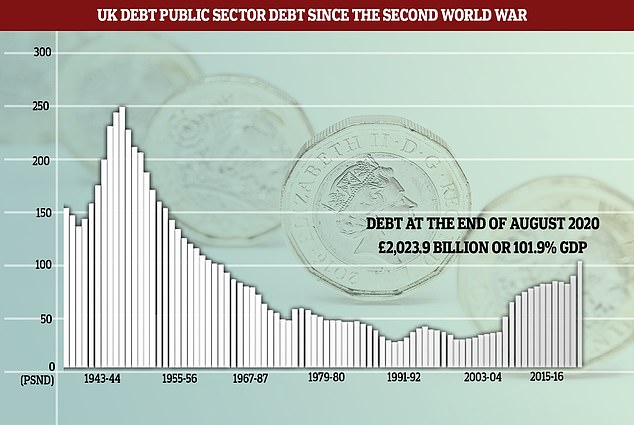



The green line on this ONS graph shows central Government expenditure this year while the blue line shows spending for last year
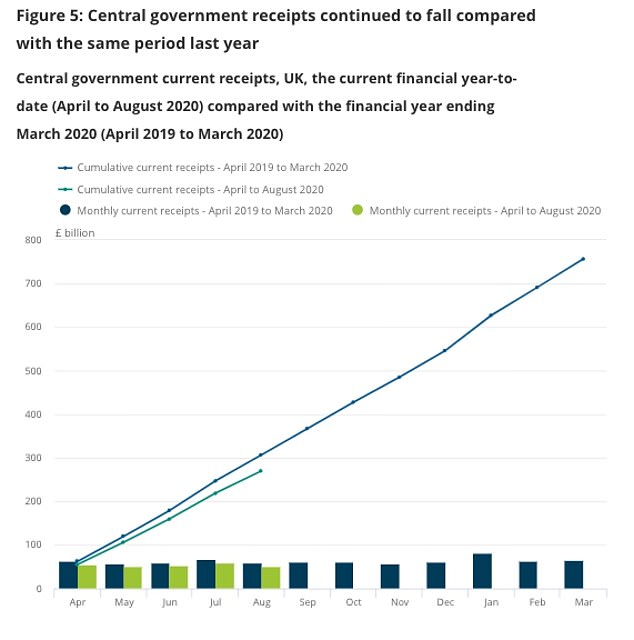

Meanwhile, the Government is having to deal with lower tax receipts. The green line shows cumulative tax receipts for this current year – lower than the blue line showing receipts for last year
‘It is right that we also look at the cost to the wider economy, these measures come at a significant fiscal cost, and that’s why it’s right we target those jobs that are viable during what is going to be sadly a difficult winter.’
The Government has faced questions over exactly what constitutes a ‘viable job’.
Mr Barclay said it was ‘one where the employer is able to bring someone back to work’.
He told BBC Breakfast: ‘That really reflects a change in focus from the initial first phase where through the furlough we protected a peak of 8.9 million jobs… to the next phase where we recognise we will be living with this virus for a longer period of time than initially thought.
‘Therefore we need to take more targeted measures rather than for people being home for a very long period of time, to start to bringing people back into the labour market where we can and, where that’s not possible, then focus very much on the skills the training and how we get them into other jobs.’
Lord Wolfson today warned Britain’s economy risks ‘becoming hooked’ on handouts as he welcomed the Jobs Retention Scheme, saying it was time firms paid more towards wages.
Lord Wolfson said Next, which has around 10 per cent of its staff on furlough, may not even need to use the scheme.
He told the BBC: ‘We don’t think we need it, but we think there are other sectors that desperately will.
‘It seems like a very sensible scheme to me. I think it’s important that employers begin to pay a little bit more for the schemes and that employees get a little bit less – because otherwise I think there’s a risk that our economy will just become hooked on it.’
Lord Wolfson was asked if he thinks city centres are ‘doomed’ and he replied: ‘I don’t think so. I think they’re going to have to change.
‘It’s not that people aren’t going to have their hair cut or aren’t going to buy sandwiches or aren’t going to go shopping, it’s that they might do less of it in city centres and more of it elsewhere.’
It was put to Lord Wolfson that a seemingly permanent shift to greater online shopping means that a lot of ‘unviable’ jobs will be in retail.
He replied: ‘I think that is right. I wouldn’t want to underestimate the difficulty that is going to cause a lot of people who work in retail.
‘I think it’s going to be very uncomfortable for a lot of people. We will inevitably, and have already, reduced the number of people working in our shops and I’d expect that to continue over the coming five or six years as the demand for retail goes down.
‘We’re taking on people in our call centre. We’re training new recruits in our call centres, in our warehousing, our distribution networks are taking on new employees.’
Lord Wolfson’s intervention came as former prime minister Gordon Brown said he believed Mr Sunak will soon have to rethink his jobs plan.
Mr Brown claimed there was nothing in the Chancellor’s message for the unemployed, those who are on universal credit and looking for employment, or young people who are outside of education and do not have a job.
He also warned that under the Jobs Support Scheme it will be ‘cheaper, I am afraid, for an employer to keep a full-time person on than to keep two part-time people on’.
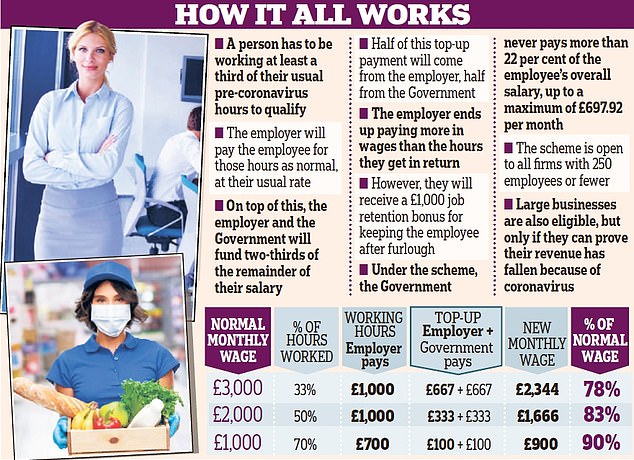

He said the Chancellor ‘has got to reconsider this’ and suggested a summit with the mayors around the regions, union chiefs and the business community would be a good move.
The ex-premier, who served as chancellor for 10 years in the former Labour government, told ITV’s Good Morning Britain programme: ‘I think he needs to come back with a better budget for jobs.
‘I suspect he knows himself this morning that he is going to have to change his measures because we have got the health restrictions, but the support for the people who are protected by them is now being reduced.’
Mr Brown also called for the four home nations to work better together to slow the spread of coronavirus and protect the UK economy.
‘If you are going to sort the problem of unemployment or testing, you really have got to work together,’ he said.
‘I think people want the governments of all the different parts of the United Kingdom to co-operate more intensively to get things done.’
Mr Brown suggested it was better to spend more money now to prop up jobs, adding: ‘Of course, if it is a one-in-a-century event, you have got to say: ‘We have got to take action now to prevent worse damage later’.’
Labour’s shadow chancellor Anneliese Dodds warned unemployment is heading towards ‘1980s levels’ despite Mr Sunak’s wage subsidy package.
‘Certainly those unemployment levels are rising very substantially, they’re going back towards 1980s levels,’ she told the BBC.
‘I think the real question now, and I asked this in Parliament yesterday of the Chancellor, is whether this system of targeted wage support will incentivise employers to keep people on.
‘That’s the real kind of million-dollar question, because if it doesn’t, if it’s not actually designed in a way that will make it economically sensible for employers to keep people on, then unfortunately it won’t be living up to the promise of other wage support schemes that we’ve seen being so successful.’
